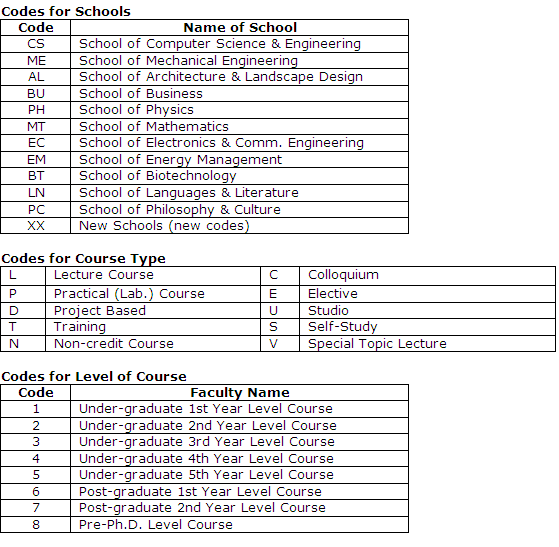Academic Session & Semester
The Academic Session is defined as period from July-June. e.g. Academic Session 2013-14 is from July 2013 till June 2014.
Each Academic Session consists of two regular Semesters identified as First Semester (Aug-Dec) & Second Semester (Jan-May). e.g. Academic Session 2013-14 First Semester (Aug-Dec 2013) & Academic Session 2013-14 Second Semester (Jan-May 2014). The semester grade sheets as well the transcript at completion of degree indicate the semester and sessions accordingly.
There may also be a Summer Semester of 8 weeks duration during the summer break period for offering various degree program or other courses as may be required, and/or feasible, in the interest of the students, including providing opportunity to students with backlog of courses to register in the Summer Semester and utilize the vacation period for clearing such courses and/or for some advance courses as permissible. The summer semester will be held during the summer break period i.e. June-July and will be considered as a part of the previous academic session. There may be an additional fee for registering for the courses in the Summer Semester.
Summer Semester
The maximum number of credits that a student can register for, in the Summer Semester, is limited to 12 credits. The syllabus of the courses registered for is not diluted in any manner and the requisite number of classes are conducted within the time-frame of the summer semester. The Minor & Major Exams are conducted during the course of the Summer Semester as per the Schedule.
In case there are a significant number of students having backlog in a particular course, the school may consider offering such course in the Summer Semester and students having obtained ‘E’ or ‘F’ grade in the previous semester(s) may register for the course. Attendance requirement in these courses will be applicable as in the regular semester.
In case of passing out students, deficient in total credit requirements up to 12 credits, they may be allowed to register in the Summer Semester upto 12 credits for the backlog courses or other eligible courses in lieu thereof. These courses may be offered on Self-Study basis also, if the number of registered students is small (upto five).
Any Student, in addition to backlog Courses, if any, is eligible to register for a maximum of 02 new (fresh) courses during summer semester (subject to upper limit of 12 Credits overall), so as to enable him/her to have more options for taking courses in the subsequent semesters. Attendance requirement will be applicable for all courses except for those on self-study basis.
Self Study Basis
Only a passing out student is eligible for registering for a course on Self-Study basis and is required to submit all the assignments and appear in the Minor & Major Exam and complete all other course related requirements as communicated by the course coordinator. A passing out student, in this context, is defined as one who is deficient by not more than 12 credits for completion of the degree.
Credit System
All programs of study are defined in terms of their credit requirements. Each course taken by a student as a part of the program of study helps to accumulate credits and once the minimum credit requirement of the program of study is completed, the degree can be awarded to the candidate, subject to fulfillment of all other relevant conditions. There may be some Audit (Non-credit) Courses; however, securing the Pass Grade (NP) in these courses is required.
Course Numbering Scheme



Core Courses, Elective Courses & Open Elective Courses
Each School has a list of approved Core Courses & Elective Courses which are offered in different semesters as per Program requirements.
In addition to the core courses and elective courses, a studentis required to register for some courses of his/her interest as Open Elective courses, which could also be prescribed as core or elective courses for students of any other program.
Course Structure Description
The structure and credits associated with each course are defined by the (L-T-P) structure which indicates the number of lecture hours /week, number of tutorial hours/week and number of practical hours /week to be devoted for the course. e.g. BUL 6011 (3-0-0). This means that this subject shall have 3 hours of lecture per week.
For calculating the number of credits associated with a subject, the following rules apply:
- Each lecture/week contributes one credit. Therefore 3 lectures / week contribute 3 credits.
- Each tutorial /week contributes one credit. Therefore 1 tutorial / week contributes 1 credit.
- Every two hours of lab work contributes 1 credit. Therefore 2 hours of practical work/week contribute 1 credit. e.g. BUL 6021 (3-1-0) means this course is worth 3+1=4 credits.
- PG students are not eligible to opt for UG courses offered by their own School
- UG students, after having earned 100 credits, are eligible to register for the PG courses
However, there can be some courses which can be Non-Credit Courses also. In such courses, the student is required to obtain a NP grade to pass the subject but will not earn any credit on passing the course. Passing the course however is mandatory. The Credit/hour structure for certain courses may vary in the B.Architecture program and is as per the course structure provided in the Course of Study.
Course Coordinator
Each course being taught has a faculty member who acts as the course coordinator for that course. The course coordinator has the complete responsibility for the conduct of that course including conduct of class-work, timely distribution of assignments, conduct of tutorials, conduct of minor and major tests, awarding of grades and attendance of students. Sometimes different parts of the course may be taught by more than one faculty member. In such a case the course coordinator has the responsibility of co-ordination amongst the concerned faculty members. The course coordinator also has the responsibility of ensuring that if a student is continuously absent from the class for more than a week at a stretch, then the Director of the school to which the student belongs is intimated in writing along with the Director of the School which is offering the course.
Program Structure
The Program structure contains the semester-wise list of Core & Elective Courses as well as the credit requirements for the Open Elective Courses to be registered and passed by the student of a program for becoming eligible for award of the degree after completing all other requirements.
The program course structure clearly enlists the Core Courses, Elective Courses and Open Elective Courses in the Program structure. School Elective courses may include courses from other Schools as specified & may be considered relevant to the program.
Under the Open Elective Course category, a student is eligible to register for any core or elective course offered by any School other than his/her own School or an additional elective course of own School. Under Open Elective Category:
Passing the core-courses of a program is mandatory while in case of an elective course a student can register for same or an alternate elective course being offered by the same School.


 SMVDU Research Scholar bags Second Position in the 3-minute Thesis (3MT) Competition...
SMVDU Research Scholar bags Second Position in the 3-minute Thesis (3MT) Competition... SMVDU, Faculty Delivers the Lecture in Short Term Training Program...
SMVDU, Faculty Delivers the Lecture in Short Term Training Program... SMVDU Researcher Declares Qualified for the Award of PhD...
SMVDU Researcher Declares Qualified for the Award of PhD... SMVDU Faculty Excels with “Young Faculty in Architecture” award...
SMVDU Faculty Excels with “Young Faculty in Architecture” award... Dr. Jindal of SMVD University conducts a session at NITTTR Chandigarh...
Dr. Jindal of SMVD University conducts a session at NITTTR Chandigarh... SMVDU Faculty Dr. Rasool bags Award in International....
SMVDU Faculty Dr. Rasool bags Award in International.... Mr. Yogesh Declares Qualified for the Award of Ph.D....
Mr. Yogesh Declares Qualified for the Award of Ph.D.... Ms. Rohini Raina, Scholar Bags Best Paper Award at Intl Conference...
Ms. Rohini Raina, Scholar Bags Best Paper Award at Intl Conference... Ms. Pooja Khajuria Declares Qualified for the Award of Ph.D....
Ms. Pooja Khajuria Declares Qualified for the Award of Ph.D.... SMVDU, Students Present Papers in an International Conference...
SMVDU, Students Present Papers in an International Conference... SMVDU Student selected for the Google Summer of Code 2023...
SMVDU Student selected for the Google Summer of Code 2023... Mr. Sushil Kumar Trisal declares qualified for the Award of Ph.D....
Mr. Sushil Kumar Trisal declares qualified for the Award of Ph.D.... Ms. Navleen Kour has been declared qualified for the Ph.D....
Ms. Navleen Kour has been declared qualified for the Ph.D.... Ms. Shipra Misra has been declared qualified for the Ph.D....
Ms. Shipra Misra has been declared qualified for the Ph.D.... Mr. Arjun Puri Declares Qualified for the award of Ph.D....
Mr. Arjun Puri Declares Qualified for the award of Ph.D.... Mr Sajid Ali Rather declares qualified for the Award of Ph.D....
Mr Sajid Ali Rather declares qualified for the Award of Ph.D....